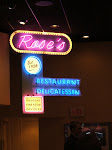I've finally gotten around to seeing the recent film adaptation of Shakespeare's The Merchant Of Venice (if I recall correctly when it was first produced it was titled The Jew Of Venice - echoing, at least in its title, Marlowe's equally controversial play The Jew Of Malta).
While I didn't go through the film line by line to compare it to the original work that it is based on, it is apparent (based on my memory at least) that some of the dialogue from the original has been left out. That's not surprising. One of the things that I think bores audiences when it comes to Shakespeare is the long speeches.
I thought that it was a good production, but I remain a fan of the stage when it comes to Shakespeare. In particular Pacino was a "great" Shylock, a character which has moved me since my first "meeting" with him. Anyway, I am not expert on acting or film production, so any comments I would make on those topics would likely be at the very least ignorant.
I can say something about the play itself, particularly of its most important figure. Obviously there has been an "eternal" debate over the nature of the play - that is whether it is anti-semitic or if it is mocking anti-semitism. It is a tough nut to crack obviously, but I myself have never been able to accept the latter argument (at least in its "pure" form). That is, the mere fact that Shakespeare would create such a character as Shylock and make him a Jew says something to me about Shakespeare even if his overall purpose was to mock anti-semitism. Of course one could equally ask whether in Macbeth if Shakespeare is commenting on the Scottish national character or whether he is merely writing a piece of royalist agitprop. Whatever the case the play - and in particular the pollyannish aspirations and fate of the twin lovers as compared to Shylock - has always stuck in my craw and probably always will.
Subscribe to:
Post Comments (Atom)


No comments:
Post a Comment